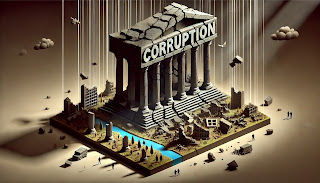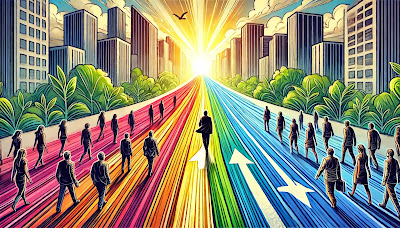Corruption ; Big One Among Billion Problems.
Corruption is like a virus that can weaken the very foundation of a nation. Whether it's political bribery, embezzlement, or manipulation in businesses, corruption can seep into every sector of a country and disrupt growth, fairness, and trust. Let’s take a closer look at what corruption is, how it affects a country, and why fighting it is critical for development.
What is Corruption?
Corruption is when someone in a position of power or responsibility uses that
power unfairly for personal gain. It can happen in many forms, such as
officials accepting bribes to grant favors, politicians misusing public funds,
or businesses bending rules to gain unfair advantages. Corruption isn't
confined to any specific country or region—it’s a global issue that can exist
at both local and national levels.
Corruption
and its result
1. Economic Damage
Corruption can wreak havoc on a country’s economy. When public funds are siphoned off for personal gain, there’s less money available for vital sectors like healthcare, education, and infrastructure. Over time, this leads to poor roads, inadequate healthcare, and underfunded schools, limiting economic growth.
For instance, companies may have to pay bribes to secure contracts, leading to inflated costs. This practice discourages honest businesses from thriving, reduces innovation, and increases the cost of goods and services, which ultimately hurts the common citizen.
In many developing countries, corruption slows economic progress by diverting resources that could otherwise be used to improve living standards. It makes international investors wary, reducing foreign direct investment and leaving the country underdeveloped.
2. Inequality and Poverty
One of the most direct effects of corruption is increased inequality. Corruption disproportionately affects the poor, who rely on public services that are often mismanaged due to corrupt practices. In countries where corruption is rampant, resources meant for welfare programs are misallocated, leaving the most vulnerable segments of society without proper support.
Imagine trying to access healthcare, education, or social services in a corrupt system—where everything is based on connections or money. The rich may find ways to bend the rules to their advantage, while the poor fall further behind, creating a cycle of inequality and poverty.
3.
Erosion of Trust in Government
When corruption becomes widespread, it
significantly damages the **trust** that citizens have in their government.
People begin to lose faith in institutions, believing that those in power
prioritize personal gain over public good. This lack of trust often leads to
civil unrest, protests, and political instability, as citizens demand
accountability and fairness.
This cycle continues from a long period. As governments lose legitimacy in the eyes of their citizens, it becomes harder to enforce laws and policies. This only perpetuates more corruption, leading to weaker governance and further instability.
4.
Weakening of Institutions and the Rule of Law
Corruption undermines the rule of law. In a corrupt society, legal and political institutions become ineffective. Laws might exist on paper, but they are not enforced fairly. Bribes, favouritism, and nepotism influence decisions, and the powerful often escape accountability.
This weakens the justice system and makes it difficult to maintain order. When people see that laws are not applied equally, it encourages even more corrupt behaviour, as individuals and businesses feel that bending the rules is the only way to succeed.
5.
Impediment to Sustainable Development
Corruption is a big obstacle to sustain progress. It misallocates resources, limits the effectiveness of environmental regulations, and promotes unsustainable practices that harm long-term growth. For instance, when corrupt officials allow illegal logging, mining, or pollution in exchange for bribes, it damages the environment and depletes natural resources that should be protected for future generations.
Additionally, countries facing widespread corruption struggle to implement global development goals, including those related to poverty, education, and clean energy.
Fighting Corruption: What Can Be Done?
While corruption is a serious issue, it is not insurmountable. Several strategies can help mitigate its effects and prevent it from spreading:
1. Strengthening Institutions: Transparent and accountable institutions are the backbone of a corruption-free society. Independent bodies that monitor government activities can ensure that officials follow the rules.
2. Raising Awareness: Educating the public about the consequences of corruption and promoting a culture of transparency can shift societal norms. Citizens must feel empowered to hold officials accountable.
3. Technological Solutions: Many countries are using digital tools to reduce corruption. By automating government processes and making data more accessible, technology can limit the opportunities for corrupt behaviour.
4. Whistleblower Protection: Ensuring that whistleblowers can safely report corruption without fear of retaliation is crucial. This encourages people to expose wrongdoing and hold officials accountable.
5. International Cooperation: Corruption is a global issue, and solving it requires international cooperation. Organizations like Transparency International work across borders to promote anti-corruption initiatives and policies.
Corruption is a significant obstacle to a country's progress, affecting everything from economic growth to public trust and environmental sustainability. While it may seem like an impossible battle, many nations have successfully reduced corruption by adopting strong legal frameworks, promoting transparency, and empowering citizens. A corruption-free society paves the way for fair, inclusive, and sustainable development, benefiting everyone in the long run.
.



Comments
Post a Comment